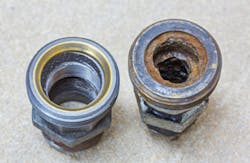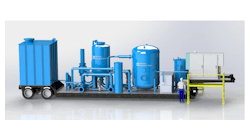Although not considered a health hazard, water dealers should educate consumers about the aesthetic and potential cost- and energy-related concerns associated with hard water. Hardness can result in scale buildup within a delivery system’s pipes and fixtures. This buildup could ultimately decrease the overall efficiency and productivity of the system. Additionally, when it comes to bathing and doing laundry, research suggests that hard water may require more soap or detergent and could be less effective in the cleaning process compared to soft water. While other minerals can impact the quality of water, hard water is mainly a result of high levels of calcium and magnesium.
"Water, being a solvent, slowly dissolves bedrock such as limestone and dolomite, releasing these minerals to the groundwater," explains Jill McDonald, product quality manager for Hellenbrand Inc., adding that water hardness is measured chemically by the amount of magnesium carbonate and calcium bicarbonate present in the water.
According to James "Jamie" Wakem II, president and CEO of Atlantic Filter Corporation, the importance of reducing hardness in a water supply will vary depending on the specific needs of the end user. "Homeowners’ benefits include less spotting on dishes and glassware, spot-free glass shower enclosures, whiter and cleaner laundry as well as less costly maintenance on water-using appliances affected by hard water," he shares. "Business owners benefit in much the same way, adding to increased customer satisfaction and substantial savings in operation and maintenance costs."
Effects of hard water
Hard water can result in various aesthetic and productivity issues, including "soap curd" and arguably the most damaging effect, scale buildup. Soap curd, notes McDonald, is a combination of hard water and soap, which can cause cleaning, doing laundry and personal care to be more difficult. "The soap-hardness ‘curd’ is difficult to rinse from clothing, tubs and hair," states McDonald. "Clothing becomes brittle over time with soap curd accumulation. People notice having to scrub sinks and tubs more vigorously and with additional cleaning products to get rid of the soap curd."
Hard water may also cause scale buildup, which can form within a system, shortening its lifespan and reducing its overall effectiveness.
"Even your icemaker in your refrigerator is affected by scale," asserts Pam McDowell, sales/office manager for Scalewatcher North America Inc. "[Scale] builds up within the system and can ruin expensive refrigerator icemakers. Dishwashers, washing machines, toilets, showerheads, faucets and all appliances and household equipment work better and have a longer life without scale buildup."
Water dealers must help educate their customers on the potential damaging effects of scale, in addition to other possible impacts such as soap curd. After all, adds McDowell, "When you treat for the cause of the problem, you can cause the problem to retreat."
A closer look at scale
As mentioned, scale can impact the performance and lifespan of an appliance. Scale may also reduce the flow of water passing through the delivery system, explains Wakem, causing pressure throughout the system to decrease.
He continues that appliances requiring "super-heated" water, such as steam units and espresso machines, will scale much quicker than other conventional appliances, resulting in more repairs and early replacements.
Additionally, the amount of energy required to heat the water increases when scale is present, and this can be especially concerning for water heaters, warns McDonald. "Not only does [scale] increase the cost to heat the water, it shortens the life of the heater when the element has to operate at higher levels to heat the water to the desired temperature," adds McDonald. "It’s not called hardness for nothing; this rock-like scale is very difficult to clean out of pipes and faucets, often leading to replacement."
New rules for energy efficiency from the Department of Energy (DOE), beginning April 16, will affect the design and installation requirements for hot water heaters, reports Wakem. As a result, tankless instantaneous gas and electric heaters are anticipated to replace many existing hot water heaters, he continues, adding that tankless heaters have proven to be "very sensitive" to hard water scaling and will require water with very low hardness to operate properly and to minimize costly maintenance issues.
Therefore, Wakem advises, "Our industry needs to stay abreast of these new rule changes and capitalize on the opportunities that will be presented to all of us in the very near future with increased demand for our products."
Treating hard water and scale buildup
Several treatment technologies are available that can remove hard water minerals and produce "soft" water — water tested below 1 grain per gallon (gpg) is considered soft. Depending on the quality of the water and the individual needs of the end user, treatment can be accomplished at the point-of-use (POU) and the point-of-entry (POE).
"A water softener helps all types of water heaters maintain their efficiency ratings over the life of the heater, saving energy and in turn money," says McDonald. "The same with dishwashers and washing machines, reducing hardness in water maintains these machines over time and allows less detergent to get clothes clean."
In 2009 the Battelle Institute studied the various effects of hard water scale on water heaters and other water-using appliances, explains McDonald, adding that the Battelle Study can be used to help assure the water industry and consumers that water softeners are good investments for saving energy.
Hardness minerals, according to the Water Quality Association (WQA), can be reduced in water by using one of three basic methods: Membrane separation softening (nanofiltration); chemical softening (lime softening, hot and cold); and cation exchange softening.
An ion exchange system is considered to be one of the most common methods for softening water. "Water softeners which use ion exchange are still today the most effective and popular means of softening water," declares Wakem. "They require the periodic addition of salt (sodium chloride or potassium chloride) to keep the system ‘recharged’ and operating properly. The calcium and magnesium (hardness) are completely removed from the water and replaced with sodium or potassium. Because of the added sodium or potassium, the water feels soft and silky on the skin when showering or bathing."
However, water softeners are commonly debated within the water industry, as the amount of salt discharge into the environment has caused concern. In fact, some states have even executed restrictions and bans on the use of these products.
Different approaches to softening have been spreading throughout the industry. One alternative, asserts McDowell, is physical water treatment systems. "[Physical water treatment systems] influence the initial crystal growth in water, resulting in much smaller and many more crystals with a rotund shape which will not adhere to surfaces but flow with the water," she continues. "Existing scale is broken down and moved downstream with the water flow without the use of chemicals or salts."
Anti-scale systems, often referred to as "no-salt" water softeners, which use medias to form hardness crystals that stay suspended in the water and help to reduce scaling, are also available, informs Wakem, noting that while they are effective at reducing scale formation and buildup in appliances and plumbing systems, they should not be confused as being able to deliver many of the benefits of traditional water softening.
Furthermore, advancements in technologies are also pushing towards advancements in treatment solutions like water softeners. Traditional softening equipment manufacturers are infusing technology into their equipment to help optimize performance and regeneration. And as these advancements continue to develop, improvements and innovations within traditional softening, as well as softening alternatives, will rise.
Water dealers must inform consumers about these various treatment solutions available and, although largely considered to be free of health risks, why it is important to treat hard water.
"Remember, [a] water distribution system, whether [in a home or business], is like [the body’s] circulatory system," says McDowell. "Just like your internal systems, clots or clogged arteries can cause major problems with your health, scale buildup in [a] home or business can cause larger, more costly problems down the road with failing pipes, water heaters, chillers, cooling towers and the like."


